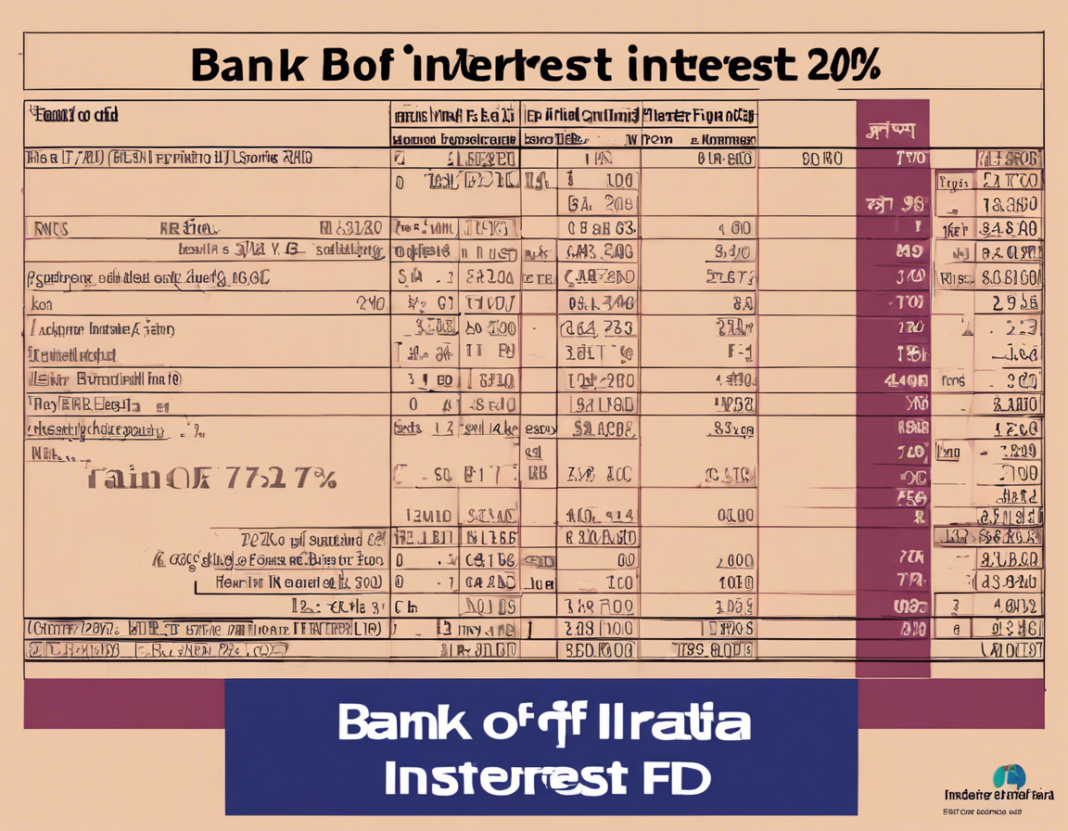Are you looking to invest your hard-earned money in a safe and reliable option that offers attractive returns? Fixed Deposits (FDs) provided by Bank of India could be a suitable choice for you. FDs are a popular investment tool among Indian investors due to their stability and guaranteed returns. In this comprehensive guide, we will discuss everything you need to know about Bank of India FD interest rates for the year 2024.
Understanding Fixed Deposits (FDs)
Fixed Deposits are financial instruments offered by banks that allow you to deposit money for a fixed tenure at a predetermined interest rate. The interest rate is fixed at the time of opening the FD and remains constant throughout the deposit period, offering a secure way to grow your savings.
Bank of India FD Interest Rates for 2024
Bank of India FD interest rates for regular customers for deposits less than ₹2 crores are as follows:
- For general tenures ranging from 7 days to 10 years, the interest rates range from 4.25% to 6.00%.
- Senior citizens, typically, enjoy an additional interest rate ranging from 0.50% to 0.75% across all tenures as compared to regular customers.
- The interest rates are subject to change and can vary based on the deposit amount, tenure, and prevailing market conditions.
Factors Affecting Bank of India FD Interest Rates
Several factors influence the interest rates offered by Bank of India on FDs:
1. RBI Monetary Policy
Changes in the Reserve Bank of India’s (RBI) key policy rates like the repo rate and reverse repo rate can impact the interest rates on FDs offered by banks, including Bank of India.
2. Economic Conditions
Fluctuations in the economy, inflation rates, and overall market conditions can influence the interest rates on FDs.
3. Competition
Competition among banks for deposits can lead to fluctuations in interest rates to attract customers.
4. Deposit Amount and Tenure
The interest rates may vary depending on the deposit amount and tenure chosen by the depositor.
Benefits of Investing in Bank of India FDs
Investing in Bank of India FDs offers several benefits, including:
- Safety: Bank of India is a trusted nationalized bank, providing a safe investment option.
- Stable Returns: FDs offer fixed returns, shielding you from market fluctuations.
- Flexible Tenure: Choose a tenure that suits your financial goals, ranging from days to years.
- Loan Facility: You can avail a loan against your FD at competitive interest rates.
How to Open a Bank of India FD?
Opening a Bank of India FD is a simple process:
- Visit the nearest Bank of India branch.
- Fill out the FD application form.
- Submit the required documents, including KYC documents and deposit amount.
- Your FD account will be opened, and a Fixed Deposit receipt will be provided.
Frequently Asked Questions (FAQs)
1. What is the minimum deposit amount required to open an FD with Bank of India?
The minimum deposit amount required to open an FD with Bank of India is usually ₹1,000. However, this amount may vary based on the type of FD and tenure chosen.
2. Can I prematurely withdraw my Bank of India FD?
Yes, you can prematurely withdraw your Bank of India FD; however, a penalty may be charged as per the bank’s rules and regulations.
3. Do senior citizens get higher interest rates on Bank of India FDs?
Yes, senior citizens are typically offered higher interest rates on Bank of India FDs compared to regular customers, providing them with an additional benefit.
4. Are Bank of India FD interest rates taxable?
Yes, the interest earned on Bank of India FDs is taxable as per the depositor’s income tax slab.
5. Can I avail of a loan against my Bank of India FD?
Yes, you can avail of a loan against your Bank of India FD at competitive interest rates. The loan amount can vary based on the FD amount and tenure.
Investing in Bank of India FDs can be a wise financial decision for individuals looking for a secure investment option with fixed returns. It is essential to carefully consider the interest rates, tenure, and terms before investing to maximize your returns. Always consult with a financial advisor before making any investment decisions to align them with your financial goals and risk tolerance.






